No products in the cart.
No products in the cart.
No products in the cart.
No products in the cart.
Home » Neurological Recovery Blog » Traumatic Brain Injury » 8 Healthy Foods That Heal the Brain After Concussion
Last updated on November 18, 2020

Wondering what to eat when you have a concussion? Your diet is an important aspect of recovery, so we scoured clinical evidence to create a list of the best foods for recovery after a concussion.
Before we dive in, let’s look at how a concussion affects the brain, and how your diet may aid in combating these effects.
When you suffer a concussion, your brain is pushed against the inside of your skull and as a result, becomes bruised. Some of the nerve tissues can also be stretched and even torn. This tearing activates certain damaging processes in the brain.
First, the balance of ions and chemicals in your brain are altered, which impairs nerve cell function. This imbalance causes production of free radicals (unstable molecules that damage your cells) which causes inflammation of brain tissue and decreased blood flow. All of this can lead to many of the effects of a concussion such as headaches, dizziness, cognitive problems, etc.
In addition, following a concussion, magnesium and zinc levels immediately drop. Both magnesium and zinc are important tools the brain uses to reduce inflammation and improve cognition after injury.
Therefore, to counter the effects of a concussion, it may help to consume foods rich in magnesium, zinc, and antioxidants that can help replenish your brain after an injury.
Want 20 pages of brain injury recovery tips in PDF form? Click here to download our free ebook “15 Things Every TBI Survivor Must Know” (link opens a pop up for uninterrupted reading)
Some of the best types of food that do this are those that contain high levels of compounds called flavonoids. Not only do flavonoids contain antioxidants that help fight the free radicals in your brain, but they also stimulate the production of BDNF, an important growth protein that acts as a fertilizer for your brain. BDNF triggers your brain to enter a process known as neurogenesis.
Neurogenesis is similar to neuroplasticity, except where neuroplasticity refers to the brain’s ability to rewire itself, neurogenesis actually involves the creation of new brain cells.
In addition, your brain is made up of about 60% fat, and nearly half of that fat is omega-3. Omega-3 is crucial for promoting BDNF and rebuilding brain cells, among other benefits.
With all this in mind, here are nine foods that can help heal the brain after concussion:
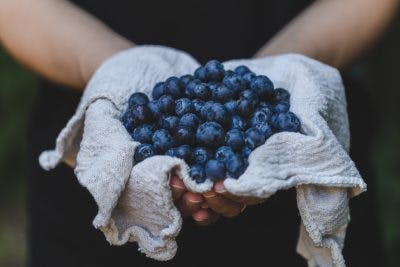
Blueberries, particularly Alaskan blueberries, contain high amounts of flavonoids and have one of the highest antioxidant levels of all common fruits and vegetables.
This makes them great for reducing inflammation and helping your brain heal from a concussion. They also can help improve communication between brain cells and maintain brain function.
To increase the amount of blueberries you consume, sprinkle them on your daily yogurt or cereal, or add them to a smoothie.
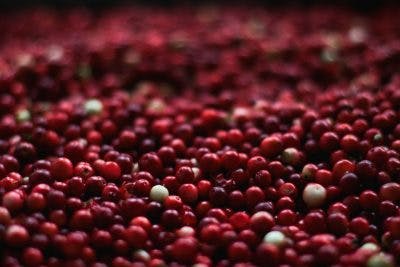
Cranberries are another fruit rich in flavonoids. Like blueberries, they help reduce inflammation in your brain and fight off free radicals.
For the most nutritional benefits, try to eat fresh cranberries. Jellied cranberry sauce and cranberry juice do not contain as many nutrients and are packed with sugar. This makes them less beneficial for concussion patients.
If you are not sure how to incorporate cranberries into your diet, check out these cranberry recipes.

Just consuming a cup or two of green tea per day while recovering from a concussion can help improve alertness, memory and cognition. It also protects your brain against free radical damage and reduces inflammation.
Besides all that, green tea contains an amino acid called L-theanine which, among other things, reduces anxiety and helps you relax without feeling tired.
Since one of the keys to making a good recovery from a concussion is avoiding stress and staying as relaxed as possible, this makes green tea an excellent drink to add to your post-concussion diet.
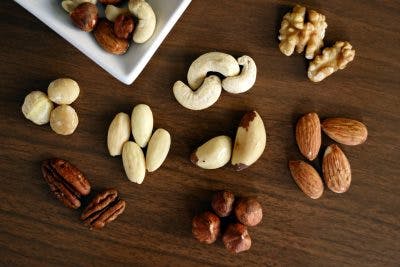
Pecans and other nuts such as walnuts are not only high in antioxidants, they are a good source of healthy fat, which helps promote brain function. This makes pecans an excellent consideration for your diet after a concussion
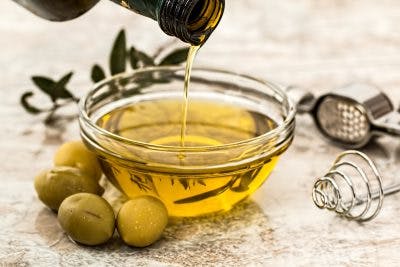
Olive oil has many positive benefits for your overall health, but what makes it great for concussion patients is that it may boost your production of BDNF.
As we said above, BDNF is crucial for promoting brain cell growth, which can help heal your brain after concussion.
To add more olive oil to your diet, try substituting it for butter when baking. You may prefer to use light olive oil instead of extra-virgin because light olive oil has a neutral taste.
You can also use olive oil to stir-fry your vegetables or use it as a dressing for your salad. Make sure to stir-fry the oil in medium heat to preserve its nutritional benefits.
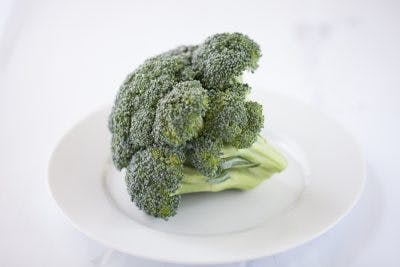
Broccoli is packed with antioxidants and other compounds that make it excellent for reducing inflammation in the brain after a concussion.
It’s also rich in vitamin K. In fact, a one-cup serving of broccoli delivers more than 100% of the recommended daily intake of vitamin K for adults.
Vitamin K helps improve cognition and memory, but what makes it especially great for brain health is that it is vital for the synthesis of sphingolipids.
Sphingolipids are a type of fat that’s densely packed into your central nervous system and helps your brain cells send signals.
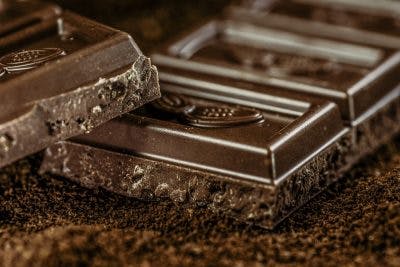
Yes, you read that right. Dark chocolate has extremely high levels of flavonoids, making it a great snack during your concussion recovery.
It’s also a rich source of magnesium, another nutrient that is depleted in the brain after a concussion.
To get the most benefits, you should try to eat chocolate containing at least 70% cocoa. The higher the percentage of cocoa, the healthier it is for your brain.
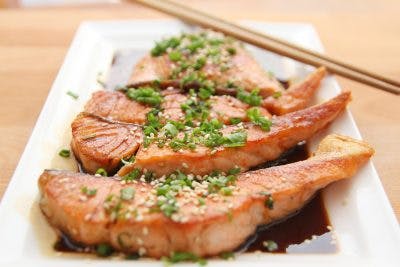
Some of the best sources of omega-3 fatty acids are in certain types of fatty fish, including:
If you’re not a seafood fan, you can also get omega-3 in certain seeds and plants. It should be noted that the type of omega-3 found in plants, called alpha-linolenic acid, is not as easily processed as the omega-3 found in fish. Therefore, you will need to consume more to obtain the same number of benefits.
Some of the best plant sources of omega-3 are:
Be sure you don’t remove the skin on walnuts when you eat them, as it also contains lots of those crucial antioxidants we’ve talked so much about.
It can also be helpful to know which foods to avoid with a concussion.
First, individuals recovering from a concussion should avoid consuming any alcohol. Not only is alcohol a neurotoxin, but drinking alcohol while recovering from a concussion can make symptoms worse.
Aside from alcohol, it’s also important to avoid foods that are high in saturated fats and processed sugars. These foods can hamper BDNF and neuroplasticity, the very things you want to promote when healing from a concussion.
Some foods high in saturated fat and sugar include:
It’s important to note that this isn’t an absolute prohibition because some of these foods (like dairy products) have important health benefits. The key is to eat these foods sparingly if you want to improve your brain’s function.
In the end, the foods you should focus on eating during your concussion recovery time need to be high in antioxidants and rich sources of omega-3.
You should also make sure the food you eat has lots of protein and calories to give your brain extra energy to heal.
In addition to the foods listed above, any brightly colored fruits and veggies will be beneficial for you. In general, the brighter the color, the more antioxidants it will contain.
We hope this article has inspired you to try some new foods that will help your brain heal from a concussion.
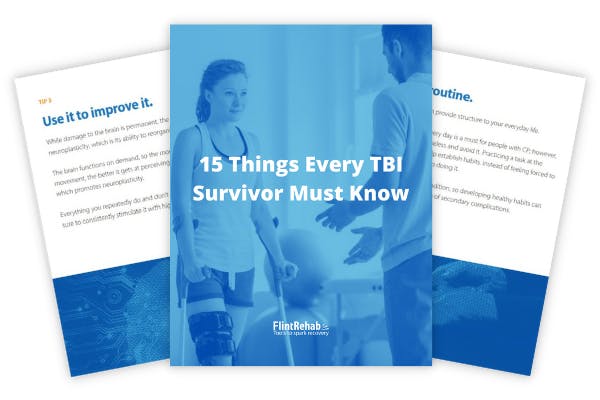
If you like our content, you’ll love our ebook and newsletters! Get instant access to our TBI recovery tips ebook with 20 pages of helpful advice by signing up below.
You’ll also receive our emails that share survivor stories and more useful TBI recovery tips, which you can opt out of at any time. (We know you’ll love them, too.)
We will never sell your email address, and we never spam. That we promise.
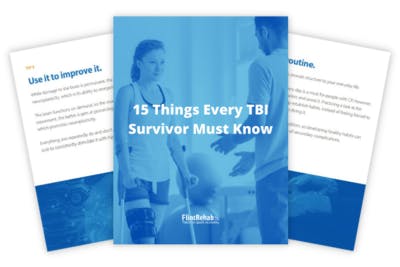

Time with a speech therapist is extremely valuable during recovery, especially if you struggle with communication, critical thinking, or memory after brain injury. Insurance typically covers speech therapy for a fixed amount of time. But once it’s over, recovery is in your hands.
That’s why a team of neuroscientists and clinicians from Boston University created the CT Speech & Cognitive Therapy app. Designed for those recovering from stroke, TBI, or living with neurological conditions, the app contains over 100,000 cognitive exercises that are all available right from your phone or tablet. That’s like having a speech therapist by your side whenever you want!
This app is the perfect fit if you want to improve your speaking, memory, or general mental sharpness. And, it’s affordable at just $29.99/month!
“For the past 6 months, my son has used the app about three times a week. The app is like a virtual therapist, it’s very easy to use, and it gives him immediate feedback.
He now understands things faster, can make decisions with less hesitation, has improved recognition of words, and his confidence is higher. I also find it easy to get in touch with customer service; they pleasantly help out. The whole experience has been great.”
— Miriam
With the CT App, you can get the guidance you need right from your phone or tablet. You can use it on your own or in between sessions with your speech therapist.
Whether you struggle with aphasia, memory loss, or critical thinking, the CT Speech & Cognitive Therapy App can help.
“The CT app has helped me gather my confidence by building on and reinforcing old forgotten skills. It helps to see my percentages increase, and work harder when they decrease. It’s very self-motivating.” -Kathryn
We are confident that this app will help improve your speech and cognitive function after brain injury. Like our recovery tools, the CT App is also covered by our 30-day money-back guarantee.

Do you know these 15 TBI recovery tips?
Get a free copy of our ebook 15 Things Every TBI Survivor Must Know. Click here to get instant access.
Grab a free rehab exercise ebook!
Sign up to receive a free PDF ebook with recovery exercises for stroke, traumatic brain injury, or spinal cord injury below: